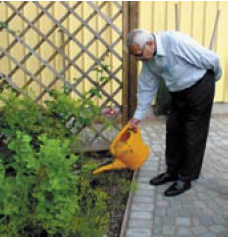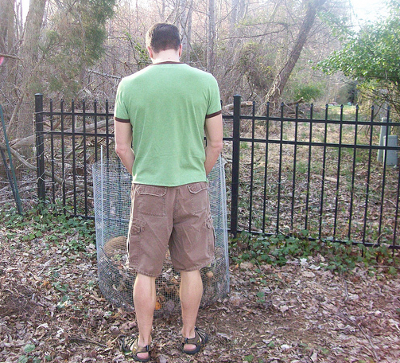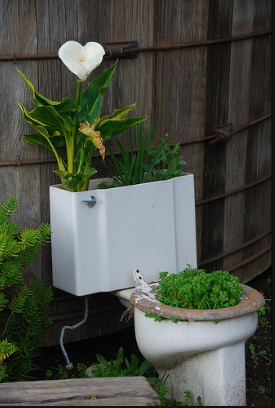
Using urine as fertilizer in the garden
 Carol Steinfeld's Liquid Gold
presents a wide array of methods to use urine in your garden.
Since urine has a C:N ratio of 0.8:1, it is far too high
in nitrogen to
be used as a straight fertilizer in most instances or you'll burn your
plants. Instead, dilute one part urine in three to ten parts
water, at which concentration urine can be used like a chemical
fertilizer. However, keep in mind that diluted urine has all of
the same pitfalls for disrupting soil microorganisms as other chemical
fertilizers do, and use it with care. The only place that I would
feel comfortable applying diluted urine directly to our plants is our
potted citrus since they crave nitrogen and are too isolated from the
soil to get their full nutritional requirements from compost.
Carol Steinfeld's Liquid Gold
presents a wide array of methods to use urine in your garden.
Since urine has a C:N ratio of 0.8:1, it is far too high
in nitrogen to
be used as a straight fertilizer in most instances or you'll burn your
plants. Instead, dilute one part urine in three to ten parts
water, at which concentration urine can be used like a chemical
fertilizer. However, keep in mind that diluted urine has all of
the same pitfalls for disrupting soil microorganisms as other chemical
fertilizers do, and use it with care. The only place that I would
feel comfortable applying diluted urine directly to our plants is our
potted citrus since they crave nitrogen and are too isolated from the
soil to get their full nutritional requirements from compost.
 In
my opinion, a better use of urine is as a high nitrogen
source to round out your compost pile. You can simply pee onto a
big pile of wood chips, leaves, sawdust, or a bale of straw turned so
that the cut ends go up, and you'll have a smaller but richer pile of
compost in six months to a year. One experimenter put a lot of
cardboard vertically in a plastic container and filled the
container with urine, ending up with rich compost in a year. For
a lower work option, Carol Steinfeld recommends peeing directly onto
woody mulches (three or more inches deep) around your trees and shrubs
--- the high carbon mulch will mitigate the high nitrogen urine and
your woody plants will get a slower meal.
In
my opinion, a better use of urine is as a high nitrogen
source to round out your compost pile. You can simply pee onto a
big pile of wood chips, leaves, sawdust, or a bale of straw turned so
that the cut ends go up, and you'll have a smaller but richer pile of
compost in six months to a year. One experimenter put a lot of
cardboard vertically in a plastic container and filled the
container with urine, ending up with rich compost in a year. For
a lower work option, Carol Steinfeld recommends peeing directly onto
woody mulches (three or more inches deep) around your trees and shrubs
--- the high carbon mulch will mitigate the high nitrogen urine and
your woody plants will get a slower meal.
 For
those of you with small city gardens (or who want to pee in the
bathroom and forget it), you might consider building a graywater
bed. Channel the urine from a urine-diverting toilet in your
bathroom to a garden bed with a layer of sand and pea gravel on the
bottom topped by good garden soil and plants. The urine filters
out through holes in the bottom of the pipe while air comes in from
the other end of the pipe to keep aerobic bacteria happy.
Replacing the sand and pea gravel with bales of straw captures any
urine leaching away and provides high quality compost, but you have to
turn and rebuild this type of bed once a year to add in new straw bales
and take out the excess compost. For best results, consider
diverting laundry water or other graywater into the bed to dilute the
urine.
For
those of you with small city gardens (or who want to pee in the
bathroom and forget it), you might consider building a graywater
bed. Channel the urine from a urine-diverting toilet in your
bathroom to a garden bed with a layer of sand and pea gravel on the
bottom topped by good garden soil and plants. The urine filters
out through holes in the bottom of the pipe while air comes in from
the other end of the pipe to keep aerobic bacteria happy.
Replacing the sand and pea gravel with bales of straw captures any
urine leaching away and provides high quality compost, but you have to
turn and rebuild this type of bed once a year to add in new straw bales
and take out the excess compost. For best results, consider
diverting laundry water or other graywater into the bed to dilute the
urine.
 Be
aware that using fresh urine to grow your own food is pretty safe since
you can't give yourself a disease you don't already have, but if you
find a way to collect a whole community's urine and apply it to your
farm, you'll probably want to sterilize it first. The simplest
way to sterilize urine is to store it in a sealed container for six
months. (Don't let air come in contact with the urine or a lot of
the nitrogen will turn into ammonia and escape, which smells bad and
also lowers the nutritional quality of your pee.) For added
safety, apply urine to crops where edible parts don't touch the ground
or wait one month after applying urine before harvesting the
crops. The absolute safest way to apply urine is below the soil
surface (such as in the graywater beds in the last paragraph or by drip
irrigation) since a
healthy soil food web will make short work of any pathogens that might
happen to be present in your pee.
Be
aware that using fresh urine to grow your own food is pretty safe since
you can't give yourself a disease you don't already have, but if you
find a way to collect a whole community's urine and apply it to your
farm, you'll probably want to sterilize it first. The simplest
way to sterilize urine is to store it in a sealed container for six
months. (Don't let air come in contact with the urine or a lot of
the nitrogen will turn into ammonia and escape, which smells bad and
also lowers the nutritional quality of your pee.) For added
safety, apply urine to crops where edible parts don't touch the ground
or wait one month after applying urine before harvesting the
crops. The absolute safest way to apply urine is below the soil
surface (such as in the graywater beds in the last paragraph or by drip
irrigation) since a
healthy soil food web will make short work of any pathogens that might
happen to be present in your pee.
| This post is part of our Urine Fertilizer lunchtime series.
Read all of the entries: |
Want more in-depth information? Browse through our books.
Or explore more posts by date or by subject.
About us: Anna Hess and Mark Hamilton spent over a decade living self-sufficiently in the mountains of Virginia before moving north to start over from scratch in the foothills of Ohio. They've experimented with permaculture, no-till gardening, trailersteading, home-based microbusinesses and much more, writing about their adventures in both blogs and books.
Want to be notified when new comments are posted on this page? Click on the RSS button after you add a comment to subscribe to the comment feed, or simply check the box beside "email replies to me" while writing your comment.

I snagged those great photos off the internet --- click on them to see the sources.
It seems to me that if you could teach your cat to pee on the plants, and then add a bit of water to dilute the urine, you'd be in great shape!
Our place came with an 8 year old crape myrtle that had never bloomed but after several months of mixed species urine it put on a stellar show and now it's sending up suckers. Cats pee in the ficus trees every autumn between the time I bring them in and get some moss over the soil. Stinks a while but seems not to hurt them even at the awful concentration I think Miss Lilly gave them last winter.
If noting else, use it on ornamental plants.
April --- Woody plants with a woody mulch do seem to be the safest place to apply urine. They seem much more able to cope with pee even undiluted. I'm very glad to hear some firsthand data!
Karen --- Sounds like you need to be collecting that cow urine!
Hey there...I have been glancing about for a while, and not found anything...
Have you seen any studies or reports on medication half-lives? How long doe sit take for these things to break down? (This has been a question I have had for a while now...interested in humanure and in urine for plant fertilization, but have yet to find any information on this. (I know I will not have any of these things in mine, but what happens if you are designing a homestead and folks need to take medications?
Someone else asked me this on facebook, and my gut reaction was "why should I care about medications? We never take anything." But it's a very valid point since the majority of Americans are much less medicine-shy than we are, and you're right that a lot of the drugs go right through you.
But it's a very valid point since the majority of Americans are much less medicine-shy than we are, and you're right that a lot of the drugs go right through you.
I tried to do a bit of research online, but kept coming to pages about how to pass a urine drug test. So, no hard data here, just speculation. If I was concerned about medicines in urine, I would probably use the urine on a compost pile or in a deep, woody mulch around a fruit tree. Fungi seem to be very good at breaking pollutants down, so I suspect if you pee into areas with lots of fungi, they would take care of it for you. That's just a guess, though!
So, no hard data here, just speculation. If I was concerned about medicines in urine, I would probably use the urine on a compost pile or in a deep, woody mulch around a fruit tree. Fungi seem to be very good at breaking pollutants down, so I suspect if you pee into areas with lots of fungi, they would take care of it for you. That's just a guess, though!
I was doing general research on human urine as a fertilizer for our backyard urban garden and found this detailed experiment. It's for an larger scale but it answers the question for medications and possible disease microbes.
http://www2.gtz.de/Dokumente/oe44/ecosan/en-human-urine-nutrient-recovery-2007.pdf